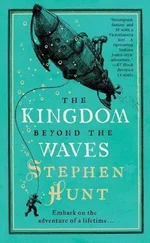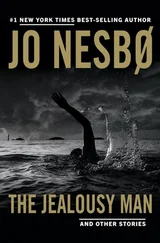‘Move, Carl, you’re blocking the light.’
I heard Carl turn towards me, yawn and walk round to the other side of the car.
As I worked away at loosening the bottom of the head from the scalp I heard Whitney Houston start singing again, about how she would never, absolutely bloody never , stop loving you.
We spread rubbish bags along the floor of my Volvo, pulled off Sigmund Olsen’s snakeskin boots and loaded the mangled corpse into the boot. Then I sat behind the wheel of Olsen’s Peugeot, glanced in the mirror and adjusted the scalp. Even with that mop of fair hair on my head I didn’t look like Sigmund Olsen, but when I put on his sunglasses the illusion was good enough to fool anyone seeing me from outside, in the dark, who would be hardly likely to suppose that it wasn’t the sheriff driving his own car.
I drove slowly, but not too slowly, through the village. No need to blow the horn or attract attention in some other way. A couple of people out walking and I saw their heads automatically turn and knew their brains would register the sheriff’s car and half consciously wonder where he was off to, at any rate he was heading out along the lakeside. Maybe in their half-asleep farmers’ brains they figured he was off to his cabin, if they knew where that was.
When I arrived at the cabin I drove down to the boathouse and turned off the engine but left the keys in the ignition. Switched off the headlights, not because anyone else lived within view but because you never know. If someone who knew Sigmund Olsen drove by and saw lights they might decide to drop in to say hello. I wiped off the steering wheel, the gearstick, the door handles. Looked at my watch. Carl had been told to drive my Volvo to the workshop, park outside so that it was clearly visible, open the place with the keys I had given him and turn on the lights so that it looked as though I was at work. Leave Olsen’s body where it was, in the boot of the car. Wait twenty minutes or so, check first there was no one walking down the road when he pulled out from the workshop, and then join me at the cabin.
I unlocked the boathouse and dragged out the dinghy. It rumbled as it glided over the track of horizontal timbers until at last the lake received the boat with what sounded like a sigh of relief. I dried the snakeskin boots with a cloth, dropped Sigmund Olsen’s bunch of keys into the right boot, tossed both boots into the dinghy and pushed it out onto the water. Stood there and watched as it glided out towards the great unknown and felt almost proud of myself. The business with the boots was a touch of genius, as people say. I mean, when they find an empty boat with just keys and a pair of boots, what else can you say? And aren’t the boots in themselves a kind of suicide note, an announcement that your wanderings on this earth are over? Yours sincerely, the depressed sheriff. You might almost say it was beautiful if it wasn’t so fucking idiotic. Fall a hundred metres down a gulley right in front of someone you’re investigating. Completely fucking unbelievable. In fact, I was far from sure I believed it myself. And as I stood there thinking all this, the idiocy just got more idiotic as the boat started drifting back towards the shore. I shoved it again, harder this time, but the same thing happened again, and a minute later the keel was rubbing against the lakeside stones again. I couldn’t figure it out. From what I remembered our teacher saying about Budalvannet’s horizontal currents, the wind direction and outflow, the boat should have been drifting away from me. Maybe we were in a backwater where everything circled round and came back in an eternal recurrence. That must be it. The boat needed to be further from the shore before it met the outflow currents and the Kjetterelva River down in the south, so that the area where Olsen could potentially have jumped overboard was so big that it was no surprise his body was never found. I stepped on board, started the motor and chugged along for a bit, turning it off again while it was still gliding away from the shore. Wiped the rudder clean, but only that. If it occurred to them to check the boat for fingerprints, it would be more suspicious if they did not find some of mine – after all, I’d been on board earlier the same day. I glanced over at the shore. Two hundred metres. Should be able to manage that. I considered climbing over the side of the boat and into the water but then realised this would stop the boat’s forward motion so instead I stepped up onto the thwart and dived. The shock of the cold water felt surprisingly like a liberation as my overheated brain suddenly cooled down for a few moments. Then I started to swim. Swimming with clothes on was more difficult than I had expected and my movements awkward. I thought of my teacher’s vertical currents, and it seemed as though I could feel them, pulling me down, and I had to remind myself it was autumn, not spring, as I parted the water in a long, clumsy breaststroke. I had no landmarks to guide me, so perhaps I should have left the headlights on after all. I remembered being taught that the legs are stronger than the arms and kicked and kicked away for all I was worth.
And then, suddenly and without any warning, I was caught.
I went under, swallowed water, rose to the surface again, splashing out wildly to get free of whatever it was that had attacked me. It wasn’t the current, it was… something else. Something that wouldn’t let go of my hand, I could feel teeth or at least jaws clamped around my wrist. I went under again, but at least this time managed to keep my mouth closed. I pressed my fingertips together, narrowed my hand and jerked it towards me. I was free. Back up on the surface I gasped for air. There, a metre in front of me in the dark, I saw something light floating on the water. Cork. I had swum into a seine net.
I calmed my breathing, and when a car with headlights on full beam drove past along the main highway I saw the outline of Olsen’s boathouse. The rest of the swim was uneventful, as people say. Apart from the fact that when I crawled ashore I realised it wasn’t Olsen’s boathouse I had seen, but possibly the owner of the seine net. I hadn’t gone far out, but it just shows how easy it is to lose your way completely. My shoes squelching, I made my way through a stand of trees towards the highway, and from there back to Olsen’s cabin.
I sat hiding behind a tree when Carl eventually arrived in the Volvo.
‘You’re soaking wet!’ he exclaimed, as though this was the most surprising thing he’d experienced all evening.
‘I’ve got dry clothes at the workshop,’ I tried to say, but my teeth were chattering like a two-stroke East German Wartburg 353. ‘Drive.’
Fifteen minutes later I was dry and wearing two pairs of overalls, one on top of the other, and my body was still shivering. We backed the Volvo into the workshop, closed the door and got the body out of the boot and onto the floor, where we sat him on his back in an X position. I looked at him. Something seemed to be missing from him, something he had had during our fishing trip. Maybe it was that mop of hair. Or the boots. Or was it something else? I don’t believe in souls, but there was definitely something, something that had made Olsen Olsen.
I drove the Volvo out again and parked it in a clearly visible spot outside the workshop. The task that lay ahead of us was a purely practical, technical business, something for which we needed neither luck nor inspiration but only the correct tools. And if there was something we had here, it was tools. There’s no need for me to go into detail about what we used where, only to say that we first removed Olsen’s belt and then cut off his clothes, and after that all his bodily parts. Or rather, I did. Carl was carsick again. I went through Olsen’s pockets and removed everything metal; coins, belt and buckle, and the Zippo lighter. I’d chuck them into the lake when I got the chance. Then I loaded all the body parts and the mane of hair in the scoop of the tractor Uncle Bernard used for clearing snow in winter. When I was done I fetched six metal drums of Fritz heavy-duty workshop cleaner.
Читать дальше












